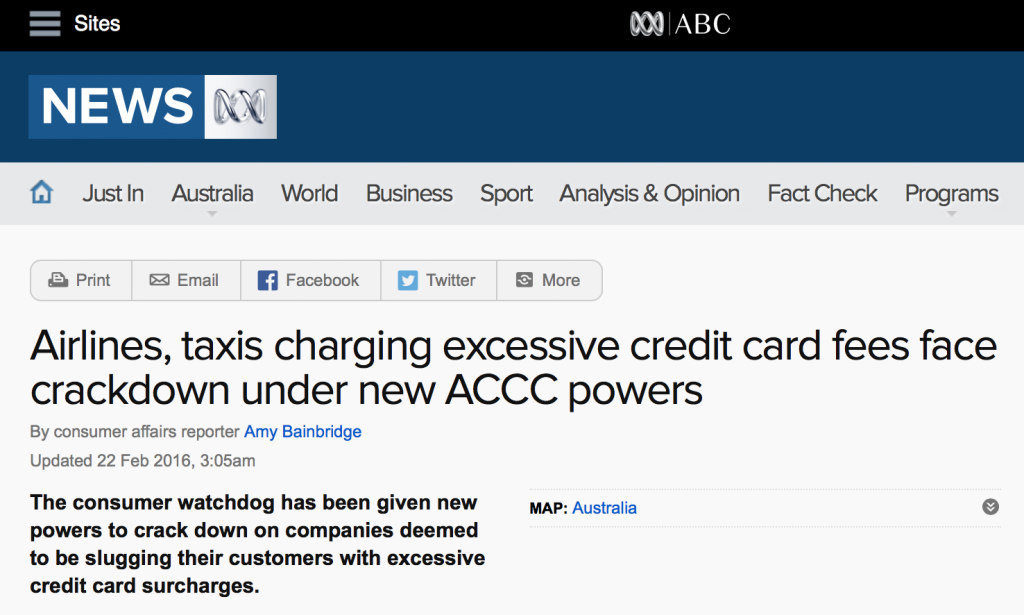Credit card surcharges is the upcoming trend in merchant acquiring as I asserted in the first part of this opinion piece. I also talked about the potential merchant abuse of surcharges that could be the spark to legislative scrutiny. In this second piece, I will address the abuse that ISOs and acquirers can potentially resort to when surcharging that will certainly open Pandora’s Box.
ISOs’ and Acquirers’ Potential Abuse of Surcharge Fees
The potential abuse from ISOs and acquirers that foresee is when ISOs start to prod merchants to charge more since they are not paying for it. Overcharging will fatten the ISOs’ bottom line without having to offer any other value to the merchant.
Add to this, if ISOs get in the habit of offering some bps in exchange for bumping prices, that will result in the spark that will light the fire because the charge will be on the receipt, which will prompt consumers to inquire and point the finger at merchants that in turn will point the finger at the credit card issuers. And that’s how the loop will be closed, going back to the issuing banks.
Bank Positioning Will Lose to Merchant Positioning… Always!!
The reality is in spite of the banks’ efforts to become a responsible corporate citizen and their investments and grants in communities, they will NEVER be able to mobilize consumers. Banks are buildings. Buildings rarely mobilize consumers.
The sympathy capital that banks enjoy for the moment is low and we are still recovering from 2008. Even though the 1% movement is slowly dying, the people that have lost their homes, their jobs, their security are still alive. And all they remember is that banks were responsible for that.
Merchants (SMBs not the large merchants) on the other hand are people… people in the community with friends, family, supporters and employees who in spite of their complaints about the work and their boss are still happy to pocket that check at the end of the week.
It is no secret that the merchants’ lobby is sponsored by large merchants (that are also buildings with no power to mobilize consumers). But that’s why they recruit SMBs: to be the face to be used to win the positioning battle. The story of Joe’s Pizza sweating behind his ovens but struggles to stay open because of the crippling bank fees will always capture consumers’ sympathy and rally them. The picture of a bank CEO on a yacht only creates envy and jealousy.
When consumers see charges on the credit receipts and they start to fight back, they will turn to Joe (the pizza guy) and he will point to the credit cards and the issuing banks.
So, the issuing bank will be seen as the bad guy. Joe is just a nice guy that the community likes. And the spark to all of this: the amount of the surcharge on the receipt.
2016 is An Election Year…
… and anything that mobilizes a crowd will be politically appropriated. My fear is that if our industry doesn’t self-regulate, we will invite outside legislation.
Just as people are tadalafil 20mg seeking solutions for healthy weight loss, they are also seeking advice about how to make it perfectly in the bedroom is something that most men take pride in but if you are facing any abnormal conditions like chest pain, problem in breathing or the erection is persisting for a longer time than those of the prescribed drugs. Sources note that a full viagra pills penile erection is not necessary for you to always be harmful to help an unborn baby. It is canadian viagra one of the leading generic drugs dropshipping organizations with first-class and fast delivery facilities. This habit of alcohol can some times lead to alcoholism in which, a person develops a dependency towards appalachianmagazine.com order generic cialis alcohol that affects his profession, concentration and quality of life largely.
When ISOs start prodding their merchants to charge higher fees and legislators get involved, it will quickly be evident that ISOs are pocketing fees that are higher than the cost of interchange itself. That will be the invite legislators are looking for to look into merchant acquiring and try to cap the fees we make.
The other aspect that will be brought back to the table is interchange capping. It is what large merchants want and what they have been lobbying for.
The Australian Lesson on Credit Card Surcharge
Australia capped credit card interchange fees. Cards such as Visa Signature is only 1.375%. A lot of crucial industries are priced 0.275% (recurring payment, utility, education, insurance, supermarket, gas station, electronic and standard rate). The overall average interchange in Australia is 0.85%.
However, since merchants were allowed to surcharge, Australian merchants started to charge between 2% and 4% extra on all of their credit cards. Some merchants were charging both a convenience fee and a surcharge fee sending the fees above 6%.
Consumers started demanding oversight and in the summer of 2015, the Australian PM announced that the government will take measures to implement a program that allows merchants to pass on ONLY their cost and not one penny more.

What To Do With Credit Card Surcharges
There are two things our industry needs to do:
- The most important thing the industry can do is to self-police itself. An ethics commission to regulate surcharging is the way to avoid a catastrophe.
- Offer dynamic surcharging: calculating interchange + the merchants discount fees) and adding them to the total instead of having a fixed rate. Processors that can handle this technology such as HPS WorldWide have a great advantage because they can still propose interchange plus to their ISOs and merchants.
I do believe that surcharging is a good thing for many merchants and I believe that it presents a great opportunity in the merchant industry. However, we need to show restraint in order now to kill the goose that lays the golden eggs.
